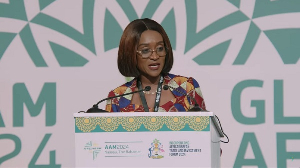The Western Regional Minister, Hon. Kwabena Okyere Darko-Mensah has cut sod for construction to begin on the extension of Ghana Water Company Main Supply Point from Daboase in Wassa East District to Supomu-Dunkwa in the Shama District.
The Minister who was accompanied by his aid, the Executive Assistant Charles Cobbinah welcomed the decision by Ghana Water Company to improve water supply in the region.
Addressing a mini-durbar organized to officially announce the project, he said it was a great honour and privilege for him to be invited to cut the sod for the extension of the Ghana Water Company Limited (GWCL) mains from Daboase Junction to Supomu Dunkwa.
"First of all, I would like to extend my heartfelt Congratulations to the Chiefs and people of Supomu Dunkwa whose patience has brought us to this stage,… I know you have waited too long for this to happen", he acknowledged.
The Regional Minister added that, "These extension works, I believe will provide a permanent solution to the water problem being faced by the people of Supomu Dunkwa. Water is essential to the very existence of man and all living things. Improving water services and uses is essential for increasing hygiene and sanitation service levels that affect productive lives of people and enhance the environment and women’s dignity".
He explained that when the extension work is completed, it will improve the local economic and social wellbeing of the people in the area.
He said water, as all Ghanaians know, is life and therefore all citizens must all have it flowing through their taps anytime they need it.

"No wonder the Sustainable Development Goal 6 (SDG 6) talks about Clean Water and Sanitation for all. Safe and affordable drinking water for all requires that we invest in the appropriate infrastructure to ensure water accessibility to all".
“As stated by the National Water Policy, Ghana has since the mid 1990’s been implementing a string of reforms in the water sector aimed at enhancing the efficiency of the production and utilization of water. These reforms have culminated in the Institutional re-alignment of key institutions in the Sector", he added.
He said lack of potable water, occurrence of drought or floods expose people, especially, women and children to water-borne and sanitation related diseases.
According to Ghanaweb’s correspondent, although the Western Region is considered to be one of the wettest areas of the country, current figures put it at the lowest end of the ladder in terms of rural potable water coverage with just 44.20%.
For him, the lowest rural water coverage is largely in part as a result of a perception held over the years that because the Region enjoys moderate to high rainfall, especially during the raining season, which invariably affords it a high water table, access to water is not difficult.
It is also due to the difficult terrain in the region, which makes access to many of the rural communities difficult, and which has consistently resulted in low investment in rural water and sanitation.
"Currently what do we want to see happening in our communities? We need to brain-storm, and take the bull by the horn. If we need something, together, we must work at it together”
Your collaboration with other Stakeholders such as the MP, the District Assembly and Investors will ensure the needed development.
I personally want to entreat Nananom, and individuals who want to see a change in their lives and communities to be business-ready. The Regional Co-ordinating Council is making much effort to bring investors to invest in the potentials of the Region", the Minister emphasized.

He noted that Western Region must move forward, and the time to do that is now.
On this note, together with officials of Ministry of Sanitation and Water Resouces and Ghana Water Company, he cut the sod for works to begin on the Water extension Services from Daboase to Supomu Dunkwa .
After the sod cutting on 26th day of August, 2019, construction, stakeholders say, will begin immediately to speed up execution of the project.
Regional News of Tuesday, 27 August 2019
Source: Daniel Kaku

















